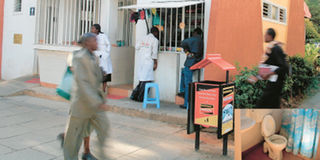Public toilets no longer filthy dens but gleaming havens

The entrance to the public toilet along Aga Khan Walk that is regulated by the Nairobi City Council, and inset, the executive suite of the public toilets outside the Railways Train Station. Photos/HEZRON NJOROGE
What in the past were filthy dens for urchins and thugs have undergone a major transformation and are providing a vital service to thousands of Kenyans.
Public toilets, an initiative that both the Nairobi City Council (NCC) and the Nairobi Central Business District Association (NCBDA) embarked on eight years ago, have transformed public sanitation within central Nairobi.
A decade ago, John Mwaniki, 50, would not walk into a public toilet no matter how much he needed to. The stench and sight of gangs of glue-sniffing urchins at the entrance was enough to scare him away.
What you need
But last week Sunday Nation met Mr Mwaniki washing his hands at the Haile Selassie Avenue Toilet No. 8.
“Let’s not even talk about the toilets of the 90s; they were horrible,” he said. “But these days you are provided with what you need, and the toilets are very, very clean.”
Mr Mwaniki, who works in the CBD, usually visits the public toilet twice a day, parting with Sh5 per visit.
Outside the same toilets sat Jeremiah Ouma Obunga, 48, basking in the sun after taking a cold shower for which he paid Sh20.
“The shower cubicles are clean. I take a shower every day,” he said. “If I come with my soap, it is cheaper, but if I don’t have it, I am charged an extra Sh10.”
And at Accra Road in Nairobi at 2 p.m., the queue outside the door to the public toilets looks like one you would expect to find at an ATM machine at the end of the month.
Maurice Kirimi, 29, one of those on the queue leading to the gents, is armed with tissue paper awaiting his turn.
Speaking to the Sunday Nation, Mr Kirimi said that whenever he gets to the toilet he finds a queue, but he is not complaining. “The toilet is a godsend. It prevents people from urinating along the corridors and making the streets stink.”
The most conspicuous sign in the toilets is “Tafadhali mwaga maji (Please clean the basin)”. A tank of water and collecting jug are situated within the toilets for users to follow these instructions.
Some CBD public toilets have shower stalls, a drier and a cubicle for the disabled. Entrance is free for children and the disabled. While many Nairobi residents recall the dirty, graffiti-stained toilet walls of the 1990s, today’s facilities are lined with spotless tiles.
Regular stall
To use most public toilets in Nairobi, one parts with Sh5; to use a shower costs between Sh10 for a regular stall and Sh50 for the executive suite at the Railways Train Station that is a room with both a toilet and shower stall.
Samuel Karanja, 29, the operator of the Accra Road public toilet, says during the high season (cold and rainy season) the toilet gets about 3,000 people each day, with the numbers dropping to 2,000 users during the low season.
This is the sixth year that Mr Karanja, the director of Kiruri Hygienic Service Providers, has managed the toilet together with four of his employees – three cleaners and a cashier by the door.
Tissue paper
Visitors to the public toilet, he said, consume 80 rolls of tissue paper a day.
In 2001, the NCC, in partnership with the NCBDA, initiated a programme to rehabilitate the 18 dilapidated public toilets in the town centre and approached local businesses for support. Then they tendered for bids from operators who could efficiently manage the toilets.
Under a management contract, an operator is hired by the NCC and assigned a toilet to manage. The NCC as regulators and owner of the land charges the operator Sh10,000 per month, while the NCBDA, which monitors the facility to ensure standards are maintained, charges an additional Sh3,000 a month.
The NCBDA conducts undercover inspections every fortnight. “We had to come up with a monitoring and evaluation process to ensure that these public toilets meet our standards and the public is provided with the required services,” said Timothy Muriuki, the NCBDA chairman.
The number of CBD toilets has risen to 28.




